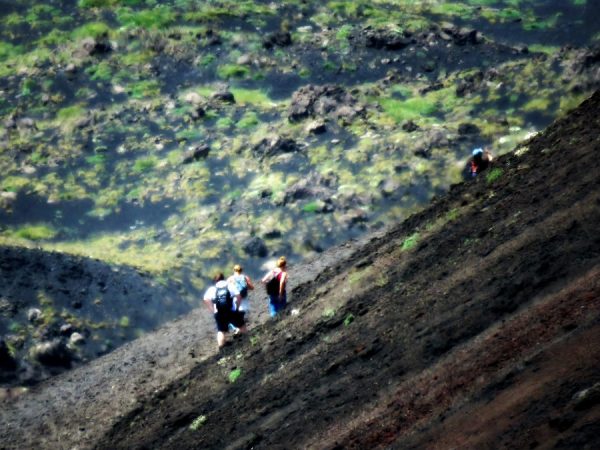They ask us, all the time. Out relatives from abroad, our friends who never came to visit us, those who look at our photos or read the news. Mount Etna erupts, Stromboli explodes, Vulcano has sulfur steams, Vesuvius sometimes makes the ground shake. How can we do that? How can we live near an active volcano?
Sounds strange, but even us – the people who live at the foot of volcanoes – should “learn how to live” with these mountains. Our great-grandparents got used to them, endured, adapted themselves, so they did not think of the problem. We are too much used to comforts of modern life so we mainly look at the troubles, rather than at the advantages, of life near a volcano. But we whould learn to understand it, instead. And love it, more and more.
Why do people settle at the foot of an active volcano?
 Villages and towns at the foot of an active volcano are not “illegal”. They use this word very much, these days, but it does not represent the real life in a volcanic region. You may call “illegal” a house built where building is forbidden. But humans have been living for ages around Etna, Stromboli, Vesuvius … since prehistoric times. They built their places agai and again, after earthquakes. They started it all over again after the eruptions. Why? Were they mad?
Villages and towns at the foot of an active volcano are not “illegal”. They use this word very much, these days, but it does not represent the real life in a volcanic region. You may call “illegal” a house built where building is forbidden. But humans have been living for ages around Etna, Stromboli, Vesuvius … since prehistoric times. They built their places agai and again, after earthquakes. They started it all over again after the eruptions. Why? Were they mad?
No, they were not. They ARE not. Because volcanoes offer a thousand advantages. The land nourished by lava ashes is rich, fertile, perfect for cultivating everything! The thermal waters that are often fed by the volcanoes still provide tourism and well-being today. Lava rock is the strongest building material in the world. The volcano then often offers unique vegetation; at times – as for example on Etna – even very rich and precious water streams, good for irrigation and for drinking. For millennia, man has been looking for the active volcano so to live in symbiosis with it. It is not “illegal” … it is collaboration. And, if you like, it is love.
Should we fear volcanoes?
Of course, one must always be afraid of an active volcano. This is why the ancestors perceived it as a god. The volcano “lends” its territory to us but takes it back whenever it wants. We are indebted to it, so we owe it respect. And respect includes dread. If you are not afraid, you end up believing yourself to be omnipotent and defying nature … the worst mistake you can make.
When you are not afraid, you build on the edge of a crater, above a tectonic fracture, in a forest at risk of fire. On the other hand, when you fear the volcano, you will set a limit. I, the human, exist where I do not harm nature. Only in this way will nature also respect me.
How do you learn to live with an active volcano?
In order to live with an active volcano it is necessary to have characteristics that should be hereditary, transmitted by those who lived here before us. If we do not have them, we have to learn them. And if we do not learn them, if we do not know how to adapt, the solution is: go away.
Patience – this is the first thing to learn. The volcano commands, we can only obey. There will
 creating art with volcanic ash
creating art with volcanic ash
always be ash falling on our houses and fields, there will always be earthquakes from time to time and roars that do not make us sleep at night. We need to be patient and sweep constantly, or use wax plugs to sleep, and maybe avoid buying flimsy knick-knacks at home!
Foresight – adapting to the volcano’s whims does not mean suffering forever. There are problems, but we try to solve them. The nearest municipalities, at risk of volcanic sand fall, must draw up permanent intervention plans for street cleaning and ash disposal. Mayors and construction workers need to team up with volcanologists to design earthquake-resistant buildings and to detect areas crossed by faults and fractures.
Information – you must always be informed, understand your territory and the mountain that dominates it. The more you know, the more you act and the less you fear certain consequences.
Passion – we must let ourselves be conquered by the (many) beautiful things that life with an active volcano gives us. You have to fall in love with the power of nature (see this video) just as tourists who come to visit fall in love with it. Passion also brings ideas … for example on how to use volcanic products for artistic, craft, tourism, ecological purposes. Also to create fun installations! And it makes it so much nicer to live in these unique and, despite everything, blessed regions. (photos by Grazia Musumeci – youtube video by Michele Mammino)